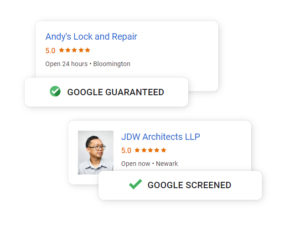A recent change to Google’s Local Services Ads may be another clue as to how that question will be answered. A program Google has been testing since early 2019 called Google Guarantee is now being rolled out more broadly. To consumers, the program is being positioned as a way for them to get insurance against poor work quality. Going through Google to a Google Guaranteed vendor that has been screened and qualified gives the consumer the ability to be refunded up to $2,000 if they are unhappy with the quality of the work performed. Seems like a great deal for consumers. More interesting, however, is how the program works on the business side.
 Per the terms of the program, businesses that pass the screening and qualification process required for Local Services Ads become eligible to pay $50 per month for an enhanced Google Guaranteed profile. Companies with the upgraded profile are listed in local search results with the ‘Google Guaranteed’ designation, a big green check mark and an information call out that tells users that the work is insured. A similar program called Google Screened exists in the professional services space. Google has been insistent that this designation does not impact what results are given in voice search, stating that “the ranking of local providers listed on the Assistant is based on relevancy and not monetized. Any local provider can become eligible to show up in those results by going through our verification process”.
Per the terms of the program, businesses that pass the screening and qualification process required for Local Services Ads become eligible to pay $50 per month for an enhanced Google Guaranteed profile. Companies with the upgraded profile are listed in local search results with the ‘Google Guaranteed’ designation, a big green check mark and an information call out that tells users that the work is insured. A similar program called Google Screened exists in the professional services space. Google has been insistent that this designation does not impact what results are given in voice search, stating that “the ranking of local providers listed on the Assistant is based on relevancy and not monetized. Any local provider can become eligible to show up in those results by going through our verification process”.
While that may be the case, it’s not hard to see how this could potentially play out. In a list of service providers, those that have the green check and insurance against poor quality are virtually guaranteed to get more clicks and engagement. That will, in turn, improve the relevancy for the listing and push it further up in rankings. This makes it increasingly more likely that, with improved relevance and higher page rank, the Guaranteed listing is the result given in response to a voice query. How this plays out when every service provider out there figures out that they need to have the designation to stand a chance in voice search is still anyone’s guess – but, for now, it appears that Google has figured out a way to indirectly monetize a space that, thus far, had not been pay-to-play.





